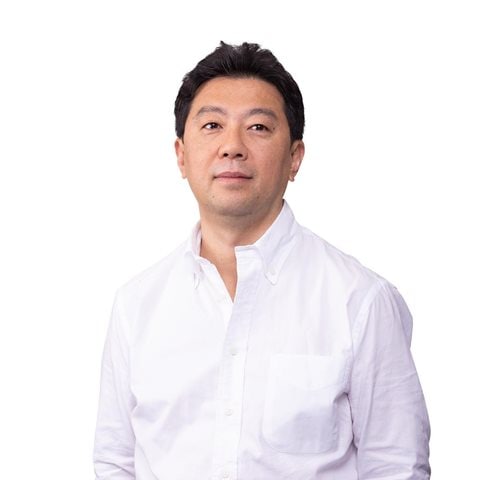In this episode of the McKinsey on Insurance podcast series, Alex Kimura speaks with Rosaline Chow Koo, the founder and CEO of CXA Group, a digital-powered benefits platform making quick gains in the Asian financial-services market.
An edited transcript of the conversation follows. For more conversations from McKinsey on Insurance, our podcast series about the trends, disruptions, and strategies that are reshaping the insurance industry today, subscribe to the series on Apple Podcasts, Google Podcasts, or Spotify.
McKinsey: You’re listening to the McKinsey on Insurance podcast. In this series, we feature experts who discuss trends, disruptions, and strategies that are reshaping the insurance industry as we know it today.
My name is Alex Kimura, and I’m a partner with McKinsey [and] based in Singapore. Today I’m excited to share a conversation with Rosaline Chow Koo, founder and CEO of CXA Group. We will hear about Rosaline’s transition from being a corporate executive to becoming a start-up CEO.
After a 30-year career that brought her to the APAC [Asia–Pacific] leadership of Mercer, Rosaline founded CXA in 2013 with the mission of transforming the delivery of employee benefits from a pen-and-paper, one-size-fits-all approach to a digitized, personalized platform. The company also aims to shift healthcare spending from treatment to prevention to improve employees’ health. We will discuss the key challenges and trends in the industry, particularly as digital analytics and innovation become mainstream, as well as the growth opportunities created by the pandemic in the years ahead.
McKinsey: Welcome, Rosaline. Tell us first about CXA and what it does.
Rosaline Chow Koo: Think of us as a super app for employee benefits: we are deeply integrated into health tech, so you can book appointments for your health screening, for your [virtual physician's appointment], or for your mental-health provider. You can also book COVID-19 testing, store your medical records, and order prescription-drug deliveries through the app.
What CXA did is build a company-funded wallet, so each employee can decide how they would like to spend their benefits money across our integrated ecosystem of health, wealth, and financial players. The amount of data we have allows insurance companies and their bank partners to cross-sell to individuals in the workplace. So it makes group insurance highly profitable, and it gives any bank partner the ability to sell wealth products.
McKinsey: When you go to a bank and you pitch your story to try to drum up business, what do you tell them? What’s your 30-second pitch to bank CEOs?
Rosaline Chow Koo: Every bank has a large enterprise base, and they typically have insurance partners. But they don’t really sell to small and midsize enterprises [SMEs], and they’ve never had access to the employees of SMEs. If insurance companies know, for example, when someone gets married, when they have kids, when they retire, or when they join a company, that’s a perfect opportunity to sell mortgages and auto loans, bundled with homeowners’ and auto insurance. So we have the data to serve the workplace. The holy grail of insurance and banking has always been to get access to each employee. Do you know enough about them? Can you target health and wealth products to them? Now we can.
We have the data to serve the workplace. The holy grail of insurance and banking has always been to get access to each employee. Do you know enough about them? Can you target health and wealth products to them? Now we can.
McKinsey: When you work with some of these corporations, how do they perceive you? As a competitor? A partner?
Rosaline Chow Koo: OCBC [Oversea-Chinese Banking Corporation], for example, calls it OCBC Health Pass powered by CXA. At HSBC, we are the employee-benefits platform for the SME bank. We are an enabler. And we remove all the middlemen—the broker, the agent, and the TPA [third-party administrator]. Removing three layers of intermediaries like that is a formula for higher profitability and revenues.
McKinsey: How do you overcome the tension of the middlemen being disrupted?
Rosaline Chow Koo: The channel was untapped. If you think about bancassurance, they’ve cross-sold to people with high net worth—the credit-card holders. But bancassurers don’t cross-sell to SMEs or the employees of SMEs, so we’re not cannibalizing agencies and brokers. And since we’re integrating the clinics and the hospitals directly, they don’t need to use the TPA. So the bancassurance SME base was untapped, and that’s why we picked it.
McKinsey: Let’s talk about technology. There’s a lot of talk about prevention, detecting diseases early, and so on. How integral are those services to CXA’s offerings?
Rosaline Chow Koo: It’s at the core of our offerings. Because we have a wallet that is funded by the company’s insurance spending, we allow each employee to decide how to use that money for their medical and dental needs. If you’re a dual-income couple and your spouse already has family coverage, for instance, you might not want to duplicate your insurance coverage. So you could use your spouse’s insurance for your medical coverage, free up the money in your account, and use that instead to get a health screening to detect if you’re prediabetic or hypertensive. We also link nutrition, mental health, chronic-disease management, and exercise services into our offerings, so we allow the money that companies were already spending for treatment to be shifted to early detection and prevention.
McKinsey: What kind of partnerships and collaborations are you looking for as additional sources of growth?
Rosaline Chow Koo: We do a lot of bancassurance deals in different countries, typically one deal per country. We did one in Hong Kong in which we onboarded 200 different companies within six months. For reference, the broker I bought took 23 years to win 200 companies. Can you imagine gaining 80,000 new members within six months in the middle of COVID-19? In Thailand, we built a joint venture with the largest insurer and a payroll company. With them, we created a bundle with payroll, plus benefits, plus health insurance. We’re also in discussions with a telco for their enterprise base. So our platform works with any firm with a corporate base where we could use a wallet to think about converging physical, financial, and mental health.
Want to subscribe to the McKinsey on Insurance podcast?
McKinsey: When you work with a corporation, oftentimes it’s quite difficult to partner because you don’t have full control of the destiny of the partnership. How do you ensure that you are in control, say, of delivering the right kind of service at the end?
Rosaline Chow Koo: It’s really about where the P&L [profit and loss] comes together, right? Because I have to work with IT, and operations, and the back office, and the bank, and the insurer, and all the product lines. I have to be aligned with the CEO because that’s where it all comes together, and it could fall apart at any step. As for the ecosystem players, it’s not just me convincing them to participate; it’s the insurer and the bank convincing them as well. And not everyone has an API [application programming interface]. In a sense, we are the plumbing and the infrastructure, because with healthcare and insurance products, you need the basic infrastructure to pull it all together.
McKinsey: Tell us more about the social dimension of the business and doing greater good for society.
Rosaline Chow Koo: This initiative started with a large Chinese client of mine. We sold them cancer insurance, but their employees were discovering late-stage cancers, so it was too late to prevent them. And they said, “Look, we pay for health screening for every one of our employees. Why couldn’t this have been caught in the early stages or precancer? We could have done something about it. Why can’t we do early detection and prevention and treatment and insurance, just in case? Why wait until someone is so sick?” They basically said what every other company said to us: “Why can’t someone consolidate all of this? Why is it all separate? And why is there no data?” So if someone can build an ecosystem that includes everything and takes care of employees—because it does take a village—that’s what every company wants.
McKinsey: There are a lot of big incumbents with a lot of capital. What’s stopping them from saying, “I’m going to do exactly what CXA is doing, and maybe even disrupt CXA”?
Rosaline Chow Koo: I think because group insurance is so unprofitable and has a low margin, a lot of places don’t bother to invest. Insurers could, but right now, there’s no economic reason to do it unless there’s proof that it works. And you have to build that proof country by country, because healthcare is local: local doctors, local insurance, local health screening, local prevention. It’s not for the faint of heart to do something like this. It’s decades in the making.
McKinsey: Do you feel like the substitution cost here is quite high?
Rosaline Chow Koo: Yes, because I didn’t expect to be doing this at 60, but I am. And I suspect I’ll be doing this at 70. It’s like when the travel industry finally aggregated everything to booking a trip, instead of having an agent fax your paperwork over and make a ton of calls. We’re at the beginning of insurance, healthcare, and financial services converging. You have to build the pipes first, then you can build things on top of it. I am the plumber that’s coming first.
McKinsey: What is the longer-term ambition—say, in the next five years or so—for CXA, and what do you think will be different five years from now?
Rosaline Chow Koo: Healthcare costs are rising everywhere. Every insurer has unprofitable group insurance, and they’re always looking at other distribution methods. To me, this is a global opportunity. We have to select which countries to go to first. In the next year, I see us being across Southeast Asia because there’s no nationalized healthcare. It’s all workplaces and SMEs. So I could build a base here. I also see a convergence over the next five years that’s not just benefits—it’s compensation and retirement as well. Could we expand across all HR functions and across all insurance and health and wealth platforms? Yes, we can. Then we can enter other regions after that. We’re being selective by focusing on Southeast Asia right now because that’s where the demand is the greatest.
McKinsey: At what point will you feel like you’ve made CXA a success?
Rosaline Chow Koo: We know right now we don’t feel that. After years, we have one case study.
McKinsey: Why? Is it profitability? Is it reaching enough customers?
Rosaline Chow Koo: Profitability will come soon—it’s probably a year away. Of course, I’ve said that every year for eight years, but I believe it. If we can be across Asia, I will feel like I’ve made it a success. And Asia is important to me because 60 percent of all diabetics globally are in Asia—China and India alone have more than 150 million diabetics.1 And we’re not like Europe, where there’s national health systems. The workplace and employees are responsible for their health. So it’s more dire here. If I could impact chronic-disease management and reduce it by using this treatment money, that would be huge. If I could do something about mental health, using company-funded money, that would be great, too.
The workplace and employees are responsible for their health. So it’s more dire here. If I could impact chronic-disease management and reduce it by using this treatment money, that would be huge.
McKinsey: As with many insurtechs and fintechs, the challenge here is really about bringing in talent to execute this vision. What’s your talent strategy? What sorts of people do you look for?
Rosaline Chow Koo: Our best tech talent came from outside of insurance, and we have insurance specialists who are product people. We look for insurance people who are open minded about the future because it’s not just one product. We’re looking at all of the products that could be sold in the workplace. I think we’re different from other start-ups. We touch fintech, since we work for the banks; we touch insurtech, since we work with the insurers; we touch healthtech, since we take raw data from the clinics and the labs and the wellness spaces; and we touch HR because we work for companies. So if you’re a candidate who wants to be at the leading edge and also do social good, we’re probably a good firm for that.
McKinsey: Over the past eight years, I’m sure there have been successes but also failures. What have you learned, and what sort of wisdom can you impart to some of the start-up founders who are looking at insurtech as a future career?
Rosaline Chow Koo: The first thing I would say is: try not to spend any money unless you need to. You may think there’s unlimited funding, but no, that’s not the truth. Be super frugal—super, super frugal. I was not. So lesson learned.
Second, the people you hire from corporate may not always make it in a start-up. They expect the same politics, bureaucracy, and structure in your start-up, and you can’t promise that stability, security, or structure. Also, if you’re going to make an acquisition, buy the smallest company—do not buy the largest company. When you buy an SME, there can be a culture clash between the SME and your tech guys. And you may never get that culture to fit together, because there’s a completely different mindset. That can distract you from your mission.
Last, find a tech-oriented cofounder if you’re a businessperson, because building that tech over and over and over again can crush you. It took us eight years to build ours, because there are so many things to figure out when insurers have no APIs. You have to build everything, and you have to build their piece, too. If you have a chief tech officer or cofounder who is really good, they’ll shorten your journey. I have so many lessons learned. If there was a pothole, I probably fell in it, and I found my way out. Don’t fall in as many holes as I have in the past. It’s painful. But as a founder, you have to be able to last through the lows.
McKinsey: Was there ever a point where you said, “This is just way too difficult—I need to give up here and go back to corporate life”?
Rosaline Chow Koo: I never wanted to go back to corporate life, but there were many times when it was quite difficult. Every start-up goes through this. When you run out of money, what do you do? You have to find a way out. There are too many people depending on you—you’re responsible for them and their families.
McKinsey: What excites you about the future?
Rosaline Chow Koo: I believe that the future standard of corporate insurance and healthcare is exactly CXA. It’s not everything being separate. People of the future will think about prevention instead of waiting until it’s too late, and everyone has control over the company spend and has personalized insurance and healthcare.



